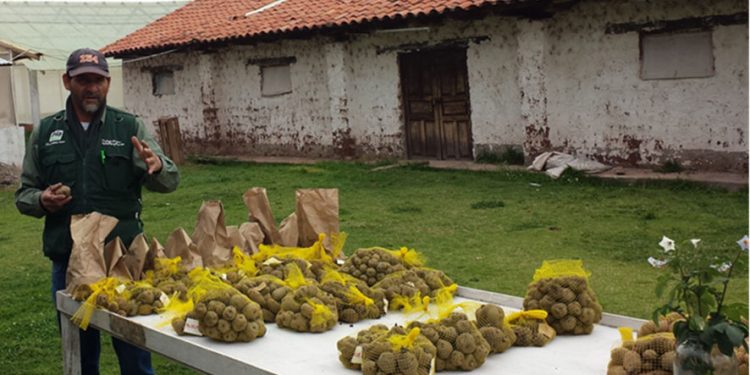In a groundbreaking collaboration spanning continents, researchers have developed two new frost-tolerant potato cultivars tailored specifically for the challenging environments of the Andes and the Altiplano. This monumental achievement, born out of an international breeding project, marks a significant advancement in agricultural resilience and food security for vulnerable regions.
Initiated at the United States Potato Genebank (USPG) in partnership with Peruvian institutions including the Instituto Nacional de Innovacion Agraria (INIA) and the International Potato Center (CIP), along with local farmers, the project aimed to bolster the cold hardiness and frost tolerance of native potato cultivars in Peru. The Andes and Altiplano regions are frequently plagued by frost, leading to substantial yield losses and threatening the livelihoods of smallholder farmers.
The key to this success lay in harnessing the genetic diversity of the wild potato relative, Solanum commersonii (cmm). Known for its exceptional freezing tolerance and cold acclimation capacity, cmm held the promise of imparting resilience to cultivated potato varieties. Through meticulous breeding efforts, researchers created breeding families combining cmm with native Peruvian potato cultivars of Solanum tuberosum subsp. andigenum (adg).
The process involved rigorous evaluations of thousands of seedlings across multiple locations in Peru, focusing on traits such as frost response, tuber quality, and yield. Over eight years of meticulous selection and field trials, 58 genotypes exhibiting exceptional frost tolerance and superior field productivity were identified. These promising candidates underwent further scrutiny, leading to the release of two advanced cultivars: Wiñay and Llapanchispaq.
Wiñay, meaning “to grow” in Quechua, made its debut in Peru in November 2018, followed by Llapanchispaq, signifying “for all of us,” in 2022. These cultivars represent a triumph of international cooperation, demonstrating the efficacy of leveraging genetic diversity to address pressing agricultural challenges. By equipping farmers with resilient varieties capable of withstanding frost, this initiative not only enhances food security but also underscores the importance of sustainable agricultural practices in mitigating the impacts of climate change.
Moreover, this project serves as a model for inclusive collaboration, emphasizing the equitable sharing of genetic resources and knowledge. By bridging scientific expertise with local insights, it exemplifies the power of collective action in advancing agricultural innovation.
In conclusion, the development of frost-tolerant potato cultivars for the Andean and Altiplano regions stands as a testament to the potential of international partnerships in fostering agricultural resilience. As climate change continues to pose existential threats to food production systems, initiatives like these offer hope for a more sustainable and secure future.







